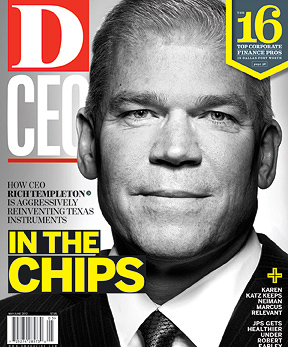In addition to their weekly rounds, Earley and the executive team make weekly discharge follow-up phone calls to some of the thousands of patients who have received services. Says Earley: “I always start each one of my discharge calls the same way. I say, ‘Hi, I’m Robert Earley; I’m the president of John Peter Smith. Did we treat you right?’ ”
Earley says he’s proud and grateful when he hears about good experiences.
“When I hear those patients and they say, ‘No, you let me down,’ I don’t like it. But then I am able to talk to folks and ask, ‘Why did we do that?’ and that’s the only way we are going to change.”
Inconsistency weighs on Earley. “What hurts me is when a patient tells me, ‘You guys are great. Thank you.’ Then I’ll call five minutes later to the next patient and they’ll say, ‘I used this service’—it’s the same service—‘and I didn’t get a good experience.’ If we can do it once, we should be able to do it every single time. We shouldn’t have disparity.
“That means your system is not hardwired. We’re not where we want to be. We want to be consistent, and we’re not at that level of consistency. It’s a change that takes constant effort, and you can’t stop.”
No Dropped Balls
As this issue of D CEO went to press, Earley and his team were anticipating an inspection visit from federal regulators—a regularly scheduled, three-year review. Earley said consistency and focus across the board would be key to a good report.
“Where we really need to make certain is the 360-level of care,” he says. “That when that patient comes in the front door, nothing is a dropped ball; nothing is a fumble at any point—that we’ve got them registered properly, that we’ve got them receiving care at a clinical level, we’ve got them receiving care in an emergency level, in an urgent-care setting. Then we have that follow-up. We’re getting them in our clinics. We’re getting them in that full gamut of healthcare.”
Earley understands government oversight and politics. He worked as a legislative assistant to former U.S. Rep. Tom Vandergriff from 1983 to 1984. Earley then served as a Democratic member of the Texas House from 1984 to 1995, after setting a goal for himself of serving 10 years in the state Legislature.
“I think being in the Legislature was a great undergraduate school to attend. I think it was wonderful place, and the lessons I learned there have been incorporated in my life,” Earley says. “The greatest thing about the Legislature is you’re constantly in a world where you don’t have agreement. The question is … what is the ultimate, ‘Here is what we concluded.’ And I think you have to have patience for that, and that’s what helps me here, because here, too, the answers are not always apparent.”
With administrative rules still pending for the sweeping 2010 federal healthcare regulations—and the possibility that courts and a new Congress will take action forcing more changes or reversing the policies—Earley says the nation’s healthcare industry will enjoy a strong voice in the process. He worries, however, whether that voice will be carefully used and clearly heard.
“I think one of the challenges that we face in healthcare is when healthcare becomes a political issue rather than a policy issue,” he says. “When it becomes political, when we get out of the realm of healthcare and decisions are made to keep or not keep somebody in office, it becomes far more challenging.”
Earley says his approach is to be very clear about how various proposals will affect JPS’ patient base. Industry groups and officials need to maintain that absolute honesty, he adds.
“They don’t need to inflate the impact or deflate the impact based on the fact that they are going to get more money,” he says. “I really think that we do need to have a level of accountability with the money we spend. And I don’t think the federal government is this faucet of money and we don’t have to be conscientious about how we spend it.”

“I think the inconsistency is the hardest thing to deal with, because you have to make budget decisions,” he says. “I think you can deal with a policy you don’t like and you can conform to it easier than you can bounce from a policy that you have in October that changes in September that changes in February.”
Scott Fisher, the network’s board chairman, calls Earley’s government experience important, but says it was not the key factor in hiring him as chief executive. “It was really more his relational style that kind of sealed the deal,” Fisher says. “The change that we felt we needed to go through was a major cultural shift that had to be a total systemic change in the way we approach our employees, the way we approach patients and families, the way we approach the community at large.”
Fisher says Earley has a self-effacing, sometimes humorous approach to building and maintaining relationships. “Robert has been very proactive in connecting with all of the cities in the county—the mayors, the city council members, the school districts, the business community, the rotary clubs,” Fisher says.
Keeping a Balance
If it’s the weekend, odds are that Earley is on a tractor or tending to one of the Clydesdale horses he raises on his family land in Gordon, in southern Erath County. If the approaching week is certain to bring tough decisions, he’s chopping wood. Tricia, Earley’s wife of 13 years, can measure the next week’s challenges by the height of the split-wood pile.
Earley emphasizes balance between work and personal life—seriousness and fun. Taking cues from Southwest Airlines Chairman Emeritus Herb Kelleher, Earley has filmed silly internal videos to help employees keep important issues in mind. He’s ridden in 100-mile bike races and taken his turn in a dunking booth to raise money for an internal fund benefiting employees facing personal financial strains. His four-digit internal extension is very easy to remember, and anyone is allowed to schedule a meeting with him.
“I try to have a balance between my mind and my heart,” Earley says. “At times, with a $650 million budget, you have to lead with your mind. It’s key to keep that balance.”
Earley says he strives for balance by taking inspiration from a variety of sources. For example, Tricia, a veterinarian, shows her concern for her patients in part by working at the animals’ eye level; Kelleher illustrated the business value of consistency and fun. Even the giant Clydesdales’ gentleness, and their endless willingness to work, inspire Earley.
Raymond Tucker, the maintenance man, provides a special inspiration every day. Earley says Tucker greets him and visitors with a smile every morning, sweeping leaves and trash from the main entrance. The next day, seemingly sweeping the same leaves and trash, Tucker is still smiling.
“He has the greatest attitude,” Earley says. “Every morning he puts me in the best frame of mind because I think, ‘My job is not as hard as that guy’s.’ He has it tough, and he does it with a smile every day.”






